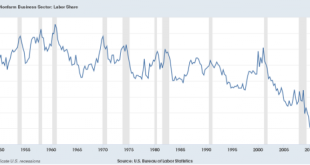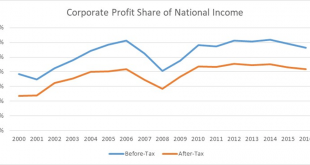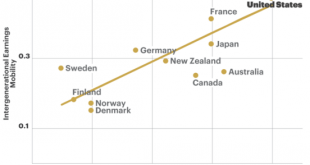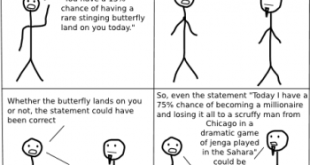from Lars Syll Whereas the Great Depression of the 1930s produced Keynesian economics, and the stagflation of the 1970s produced Milton Friedman’s monetarism, the Great Recession has produced no similar intellectual shift. This is deeply depressing to young students of economics, who hoped for a suitably challenging response from the profession. Why has there been none? Krugman’s answer is typically ingenious: the old macroeconomics was, as the saying goes, “good enough for government...
Read More »Six lies on trade
from Dean Baker After 500 days of Donald Trump’s presidency, it is clear that any relationship between his statements and the truth are purely coincidental. He even boasts about his lack of interest in the truth, touting the fact that he had no idea what our trade deficit was with Canada when he confronted Canadian Prime Minister Justin Trudeau over our “$100 billion trade deficit.” (The actual figure is around $20 billion.) But Donald Trump’s contempt for the truth should not cause the...
Read More »I ran out of words to describe how bad the recovery numbers are
from David Ruccio Back in June, Neil Irwin wrote that he couldn’t find enough synonyms for “good” in an online thesaurus to describe the jobs numbers adequately. I have the opposite problem. I’ve tried every word I could come up with—including “lopsided,” “highly skewed,” and “grotesquely unequal“—to describe how “bad” this recovery has been, especially for workers. Maybe readers can come up with their own adjectives to illustrate the plight of Americans workers since the Second Great...
Read More »The randomistas revolution
from Lars Syll In his new history of experimental social science — Randomistas: How radical researchers are changing our world — Andrew Leigh gives an introduction to the RCT (randomized controlled trial) method for conducting experiments in medicine, psychology, development economics, and policy evaluation. Although it mentions there are critiques that can be waged against it, the author does not let that shadow his overwhelmingly enthusiastic view on RCT. Among mainstream economists,...
Read More »Intellectual property and China: No One is back
from Dean Baker I sometimes go under the professional name of “No One” as in “no one saw the financial crisis coming.” I apparently need to use this identification again when it comes to trade war with China. On Morning Edition today, Jeff Greene interviewed Jonah Goldberg, senior editor at National Review. Mr. Goldberg told Greene how conservatives are free traders so they generally are opposed to Trump’s tariffs. He then suggested that a way out for Trump would be to focus on China’s...
Read More »Econometrics cannot establish the truth value of a fact. Never has. Never will.
from Lars Syll There seems to be a pervasive human aversion to uncertainty, and one way to reduce feelings of uncertainty is to invest faith in deduction as a sufficient guide to truth. Unfortunately, such faith is as logically unjustified as any religious creed, since a deduction produces certainty about the real world only when its assumptions about the real world are certain … Assumption uncertainty reduces the status of deductions and statistical computations to exercises in...
Read More »Businesses can’t find qualified CEOs, don’t know how to raise wages
from Dean Baker That’s the implication of this CNBC piece that claims that hiring is down because businesses can’t find qualified workers. If this is really the problem, then the solution, as everyone learns in intro economics, is to raise wages. For some reason, CEOs apparently can’t seem to figure this one out, since wage growth remains very modest in spite of this alleged shortage of qualified workers. Businesses should be well-positioned to absorb higher wages since their profits have...
Read More »The Great Gatsby Curve
from The Atlantic Economists represent this concept with a number they call “intergenerational earnings elasticity,” or IGE, which measures how much of a child’s deviation from average income can be accounted for by the parents’ income. An IGE of zero means that there’s no relationship at all between parents’ income and that of their offspring. An IGE of one says that the destiny of a child is to end up right where she came into the world.
Read More »So much for ‘statistical objectivity’
from Lars Syll Last year, we recruited 29 teams of researchers and asked them to answer the same research question with the same data set. Teams approached the data with a wide array of analytical techniques, and obtained highly varied results … All teams were given the same large data set collected by a sports-statistics firm across four major football leagues. It included referee calls, counts of how often referees encountered each player, and player demographics including team...
Read More »A Tale of Three Classes in the USA
from The Atlantic Saez / Zucman
Read More » Real-World Economics Review
Real-World Economics Review








